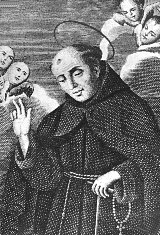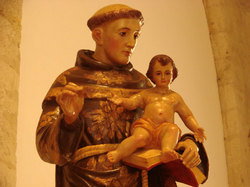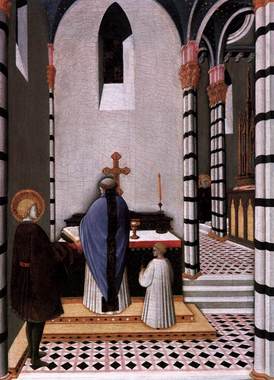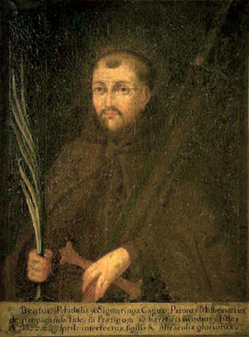 I thank Christ Jesus our Lord, who has strengthened me, that he has made me his servant and judged me faithful, alleluia.
I thank Christ Jesus our Lord, who has strengthened me, that he has made me his servant and judged me faithful, alleluia.
Tag: Franciscan saints and blesseds
Blessed Giles of Assisi
The just man will flourish like the palm tree. Planted in the courts of God’s house, he will grow great like the cedars of Lebanon, alleluia.
Saint Conrad of Parzham
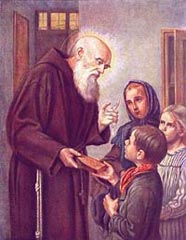 Ask and you shall receive; seek and you shall find; knock and it shall be opened to you, says the Lord, alleluia.
Ask and you shall receive; seek and you shall find; knock and it shall be opened to you, says the Lord, alleluia.
Saint Peter Regalado
The upright live forever, their reward is with the Lord and the Most High has them in His care.
Blessed Diego José of Cádiz
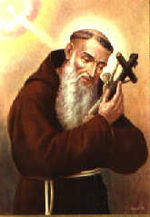 O God, who did endow Thy blessed confessor, Diego,
O God, who did endow Thy blessed confessor, Diego,
with the science of the saints and didst work wonders through him for the
salvation of his people, grant us through his intercession to think those
things that are right and just, so that we may arrive safely at the kingdom of
Thy glory.
Blessed Angela Salawa
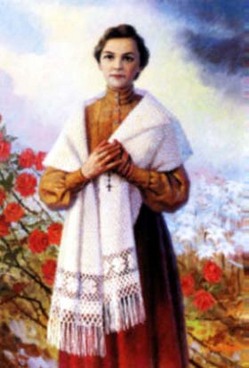 In Scripture and the Liturgy we read: “Come, blessed of my Father, says the Lord: I was ill and you comforted me. I tell you, anything you did for one of my brothers, you did it for me.”
In Scripture and the Liturgy we read: “Come, blessed of my Father, says the Lord: I was ill and you comforted me. I tell you, anything you did for one of my brothers, you did it for me.”
Let us pray with the Church:
Saint John Joseph of the Cross
He was in prayer and even spent the night praying and giving
thanks.
Father, You raised Your servant Saint John Joseph of the Cross through
the rugged way of poverty, humility and patience to heavenly glory. Grant us
the grace to follow his example so as to share in eternal joy.
Saint John
Joseph comes from the island of Ischia, off the coast of Naples. Some might say
it is better than Capri. Virtuous from his earliest days he followed the path
set by Saint Peter of Alcantara -the same person who was a spiritual father to
Saint Teresa of Jesus– who developed a strict observant Franciscan fraternity
which emphasized contemplation and penance. John Joseph was such an exemplary friar
that he was asked to be ordained a priest and to make Franciscan foundations.
In time he was appointed both master of novices and provincial superior. His
humility endeared him to others; he insisted on menial tasks even though he had noble birth and positions of influence. John Joseph was zealous for souls and it is
reported that he had the gift of prophecy and healing. As an insightful
confessor John Joseph would encourage people to pray, live simply and be
devoted to the Blessed Virgin Mary.
More on Saint John Joseph can be read here.
Blessed Agnes of Prague
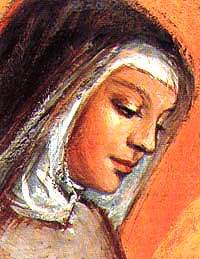 Let us rejoice and shout for joy, because the Lord of all things has favored this holy and glorious virgin with his love.
Let us rejoice and shout for joy, because the Lord of all things has favored this holy and glorious virgin with his love.
Saint Conrad of Piacenza
The teaching of truth was in his mouth, and no wrong was found on his lips. he walked with me in peace and justice, and turned many away from wickedness.
Prayer as love in light of Saint Anthony of Padua
I present the Wednesday (February 10, 2010) Address of Pope Benedict on Saint Anthony of Padua, following upon his talks on Saints Francis and Dominic in the past weeks. What is a stake here for the Pope? It is being centered totally on Jesus Christ. Nothing else matters. Prayer, a relationship of love with God is a constant. As the pope will note below, you can’t make progress in the spiritual life if you do not pray and live a life of virtue.
And now, the pope…
After presenting two weeks ago the figure of Francis of Assisi, this morning I would like to speak about another saint belonging to the first generation of Friars Minor: Anthony of Padua or, as he is also called, of Lisbon, referring to his native city. He is one of the most popular saints in the whole Catholic Church, venerated not only in Padua, where a splendid basilica was built, which houses his mortal remains, but in the whole world. Dear to the faithful are images and statues that represent him with the lily, symbol of purity, or with the Child Jesus in his arms, in memory of a miraculous apparition mentioned in some literary sources.
Anthony contributed in a significant way to the development of Franciscan spirituality, with his outstanding gifts of intelligence, balance, apostolic zeal and, mainly, mystical fervor.
He was born in Lisbon of a noble family around 1195 and was baptized with the name Fernando. He entered the canons who followed the monastic rule of St. Augustine, first in the monastery of St. Vincent in Lisbon, and subsequently in that of the Holy Cross in Coimbra, renown cultural center of Portugal. He dedicated himself with interest and solicitude to the study of the Bible and of the Fathers of the Church, acquiring that theological science that he made fructify in the activities of teaching and preaching.
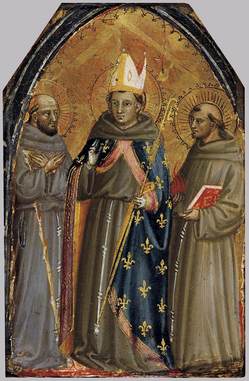
The episode that marked a decisive change in his life took place in Coimbra: In 1220 the relics were exposed there of the first five Franciscan missionaries who had gone to Morocco, where they met with martyrdom. Their case aroused in young Fernando the desire to imitate them and to advance in the way of Christian perfection: He then asked to leave the Augustinian canons and become a Friar Minor. His request was accepted and, taking the name Anthony, he also left for Morocco, but Divine Providence willed otherwise. As the consequence of an illness, he was obliged to return to Italy and, in 1221, he took part in the famous “Chapter of the mats” in Assisi, where he also met St. Francis. Subsequently, he lived for a time totally hidden in a convent near Forli, in the north of Italy, where the Lord called him to another mission. Invited, by totally accidental circumstances, to preach on the occasion of a priestly ordination, he showed he was gifted with such learning and eloquence that the superiors destined him to preaching. Thus he began in Italy and France such an intense and effective apostolic activity that he induced not a few persons who had separated from the Church to retrace their steps. He was also among the first teachers of theology of the Friars Minor, if not even the first. He began his teaching in Bologna, with Francis’ blessing who, recognizing Anthony’s virtues, sent him a brief letter with these words:
“I would like you to teach theology to the friars.” Anthony set the foundations of Franciscan theology that, cultivated by other famous figures of thinkers, came to its zenith with St. Bonaventure of Bagnoregio and Blessed Duns Scotus.
Becoming provincial superior of the Friars Minor of northern Italy, he continued with the ministry of preaching, alternating that with administrative tasks. When his mandate as provincial came to an end, he retired near Padua where he had already been other times. Barely a year later, he died at the gates of the city on June 13, 1231. Padua, which in life had received him with affection and veneration, showed him forever honor and devotion. Pope Gregory IX himself, after hearing him preach, described him as the “Arc of the Testament,” and canonized him in 1232, also as a result of the miracles that happened through his intercession.
In the last period of his life, Anthony committed to writing two series of “Sermons” titled, respectively, “Sunday Sermons” and “Sermons on the Saints,” written for preachers and professors of theological studies of the Franciscan Order. In them he comments on the texts of sacred Scripture presented by the liturgy, using the Patristic Medieval interpretation of the four meanings: the literal or historical, the allegorical or Christological, the tropological or moral, and the anagogic, which guides to eternal life. They are theologic-homiletic texts, which take up the lively preaching in which Anthony proposes a true and proper itinerary of Christian life. The wealth of the spiritual teachings contained in the “Sermons” is such that, in 1946, the Venerable Pope Pius XII proclaimed Anthony a doctor of the Church, attributing to him the title of “Evangelic Doctor,” because from these writings arises the freshness and beauty of the Gospel; even today we can read them with great spiritual profit.
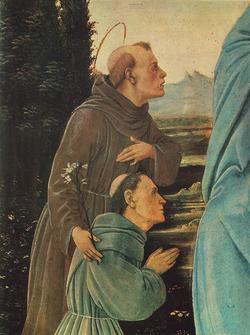
In them, he speaks of prayer as a relationship of love, which drives man to converse sweetly with the Lord, creating an ineffable joy, which gently envelops the soul in prayer. Anthony reminds us that prayer needs an atmosphere of silence, which is not the same as withdrawal from external noise, but is an interior experience, which seeks to remove the distractions caused by the soul’s preoccupations. According to the teaching of this distinguished Franciscan doctor, prayer is made up of four indispensable attitudes which, in Anthony’s Latin, are described as: obsecratio, oratio, postulatio, gratiarum actio. We could translate them thus: to open one’s heart confidently to God, to speak affectionately with him, to present to him our needs, to praise him and to thank him.
In this teaching of St. Anthony on prayer we see one of the specific features of Franciscan theology — of which he was the initiator — namely, the role given to divine love, which enters in the sphere of affection, of the will, of the heart and which is also the source from which springs a spiritual knowledge that surpasses all knowledge.
Anthony writes: “Charity is the soul of faith, makes it alive; without love, faith dies” (Sunday and Holy Days Sermons II, Messagero, Padua, 1979, p. 37).
Only a soul that prays can make progress in the spiritual life: this is the privileged object of St. Anthony’s preaching. He knows well the defects of human nature, the tendency to fall into sin; that is why he constantly exhorts to combat the inclination to covetousness, to pride, to impurity and to practice the virtues of poverty and generosity, of humility and obedience, of chastity and purity. At the beginning of the 13th century, in the context of the rebirth of the cities and the flourishing of trade, there was an increased number of people who were insensitive to the poor. Because of this, Anthony many times invites the faithful to think of true wealth, that of the heart, which, making them good and merciful, makes them accumulate treasures for Heaven. “O rich people,” he exhorts, “befriend… the poor, welcome them in your homes: They will then be the ones who receive you in the eternal tabernacles, where the beauty of peace is, the confidence of security, and the opulent quiet of eternal satiety” (Ibid., p. 29).
Is not this perhaps, dear friends, a very important teaching also today, when the financial crisis and the serious economic imbalances impoverish not a few persons and create conditions of misery? In my encyclical Caritas in Veritate, I remind that: “The economy needs ethics in order to function correctly — not any ethics whatsoever, but an ethics which is people-centred” (No. 45).
In Francis’ school, Anthony always puts Christ in the center of life and thought, of action and preaching. This is another typical feature of Franciscan theology: Christ-centeredness. Willingly [this theology] contemplates and invites to contemplate the mysteries of the Lord’s humanity, in a particular way, that of the Nativity, which arouse feelings of love and gratitude toward divine goodness.
Also the vision of the Crucified inspires in him thoughts of gratitude to God and of esteem for the dignity of the human person, so that all, believers and non-believers, can find a meaning that enriches life. Anthony writes: “Christ, who is your life, is hanging before you, because you look at the cross as in a mirror. There you will be able to know how mortal were your wounds, which no medicine but that of the blood of the Son of God could have cured. If you look well, you will realize how great are your human dignity and your value … In no other place can man realize better how much he is worth, but by looking at himself in the mirror of the cross” (Sunday and Holy Days Sermons III, p. 59).
